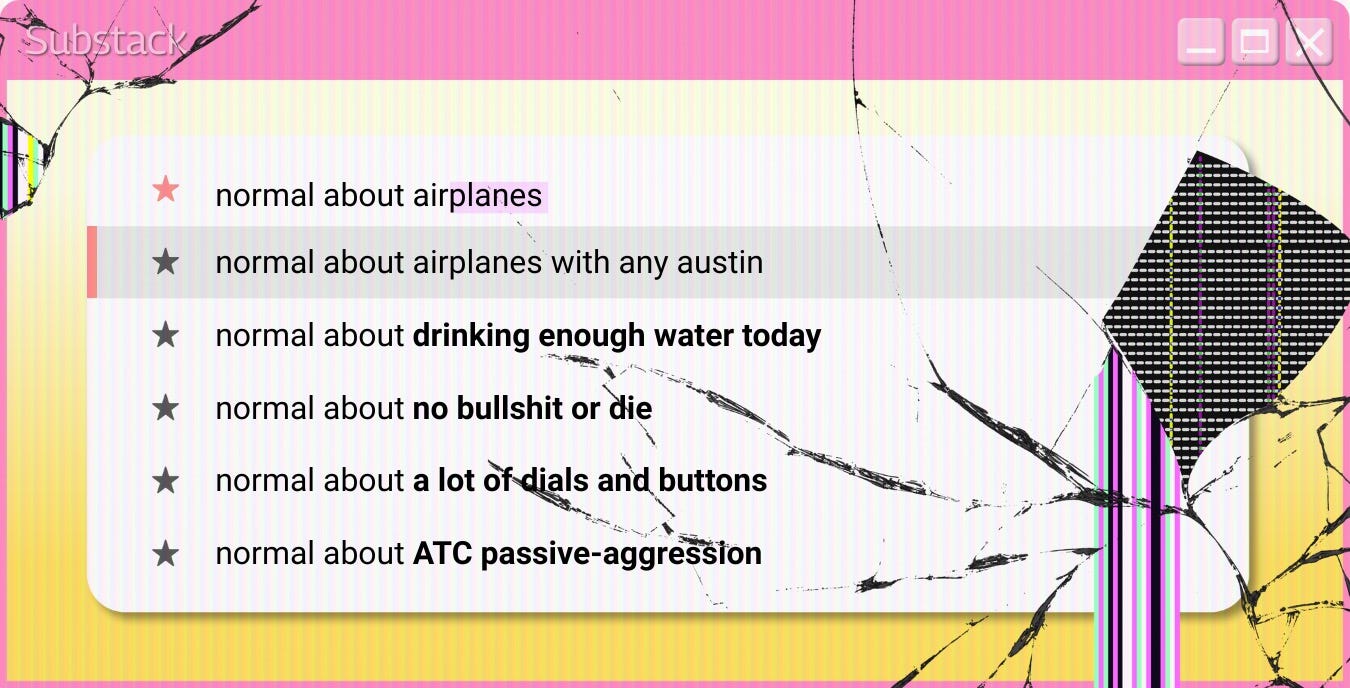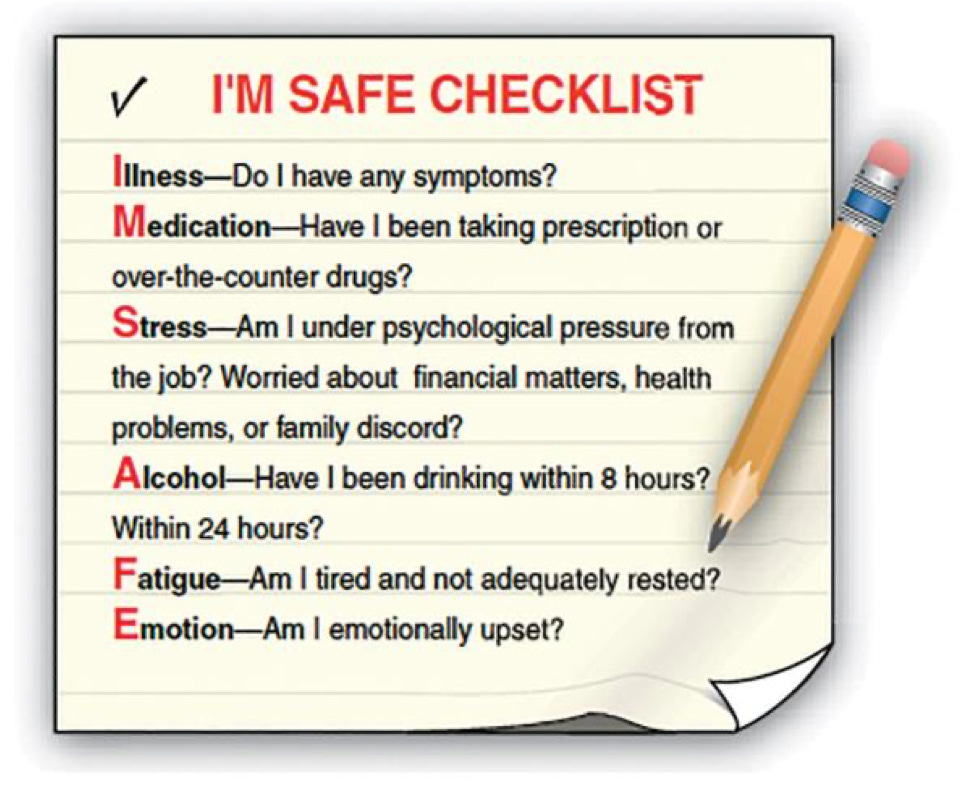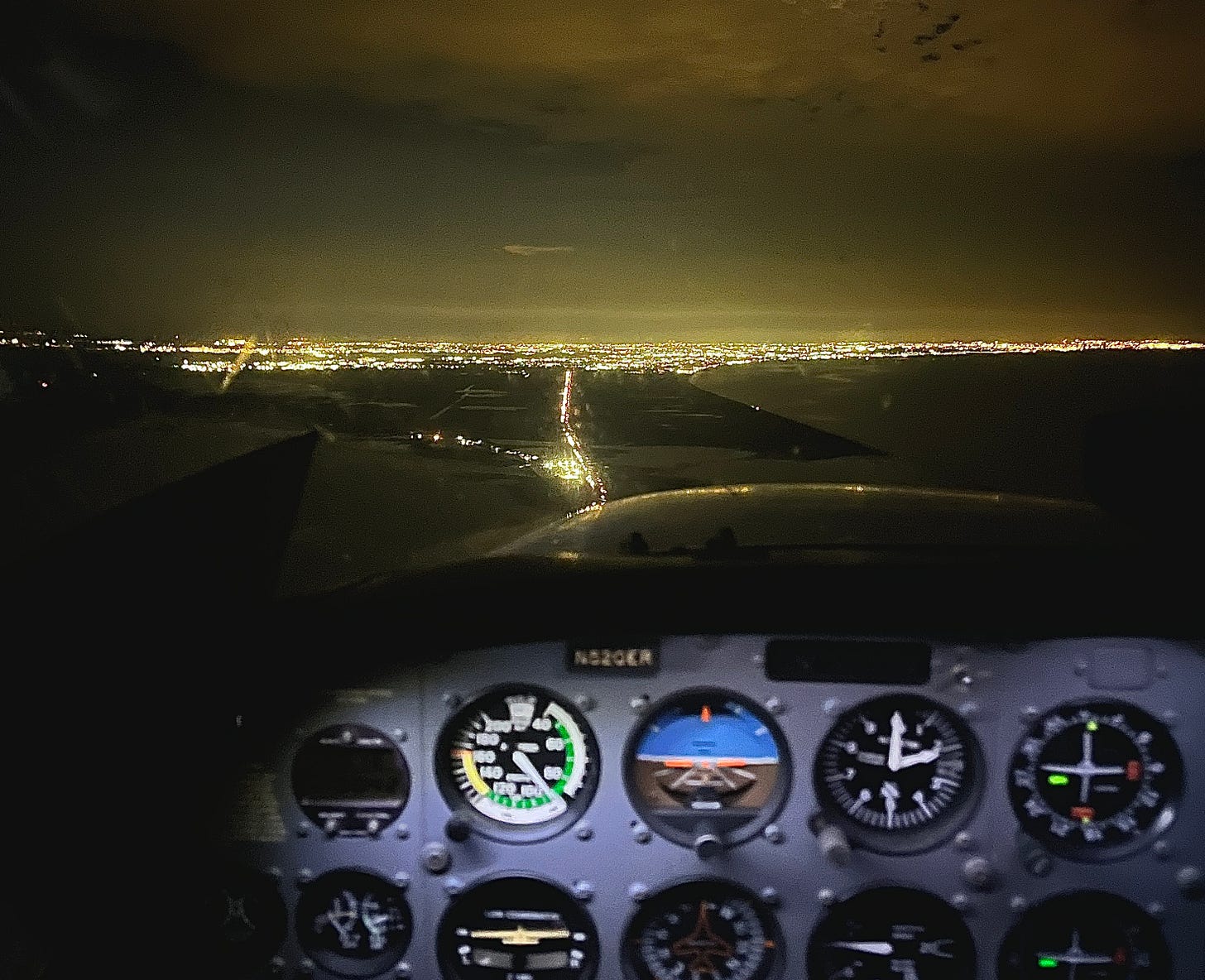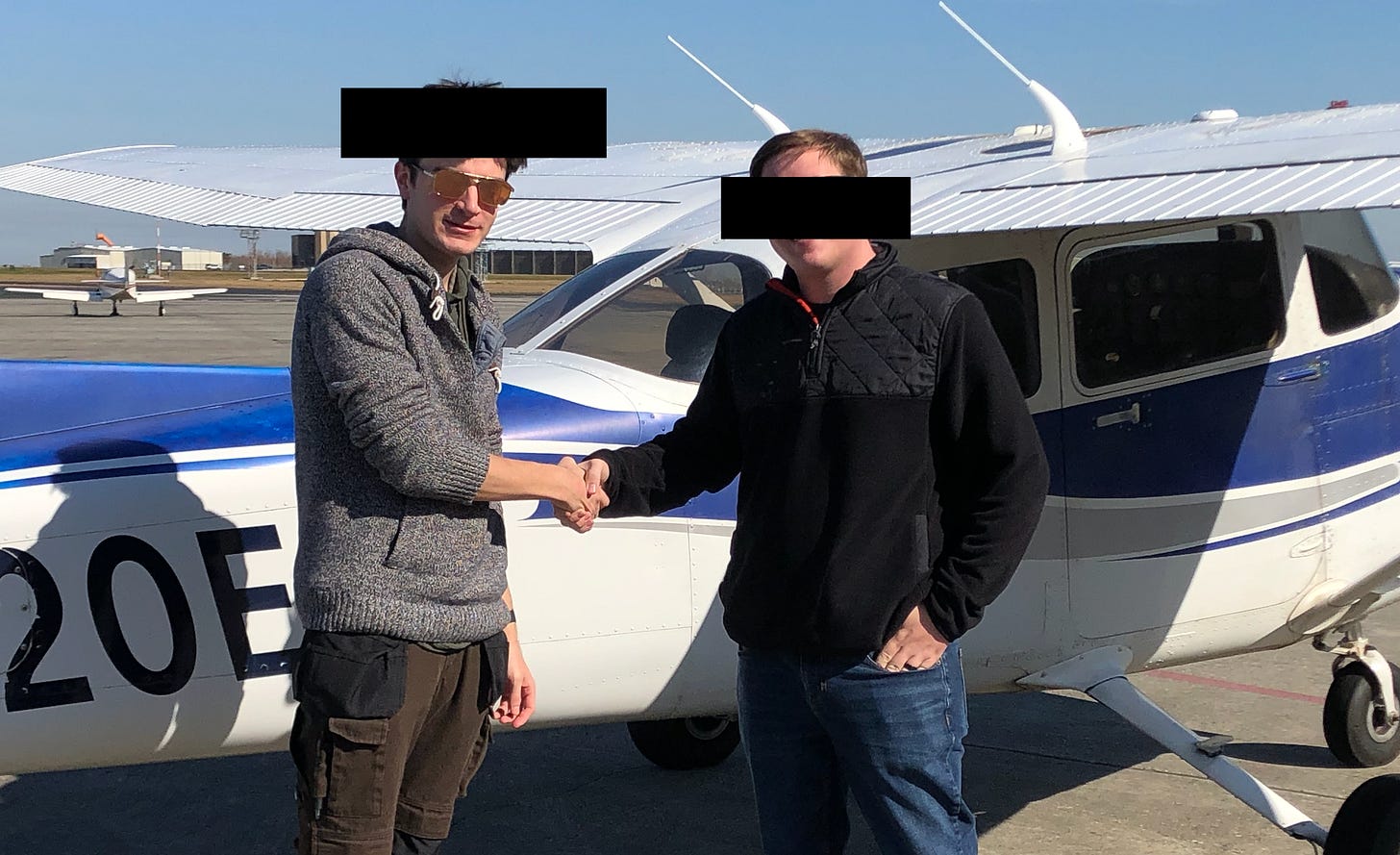a youtuber is normal about planes
any austin on aviation, mindfulness, and checking your tire pressure
Any Austin is a wildly famous and successful YouTuber (and previous Normal About It citation) best known for tackling gaming’s most hot-button issues, including the unemployment rate in Skyrim and how Fallout 3’s NPCs get home after a long day at the nuclear wasteland. Today he is feeling normal about flying planes, a hobby that became “irresistible-ish” to him during COVID thanks to the sky-high (...) stakes and the self-awareness those stakes demand. As Austin tells us, “if you're bullshitting about your ability to fly an airplane, you die” — naturally, this is something that brings him great comfort.
This interview has been edited for clarity, coherence, and vibes.
JADIE: What are you feeling completely normal about today, and how did you first encounter it?
ANY AUSTIN: I'm feeling completely normal about airplanes. And I know that's obviously the name of this Substack, but I do think I actually have a very normal opinion of airplanes, in that I love them and I think they should be loved and appreciated.
I grew up in a household that didn't have too much money, but when I was very young, my dad told me that he attempted to get his pilot’s license and that it cost him ten thousand dollars. As a kid, ten thousand dollars was a rich person amount; that's Jeff Bezos levels of wealth in my head at that time. And so I tied airplanes to that. I was like, Flying an airplane is the most unattainable, 1% of the 1% activity. Still kind of true. Not as true as I thought it was, in hindsight.
NICOLE: Flying the plane was unattainable, or just interacting with planes generally?
ANY AUSTIN: Well, I never took trips on planes as a kid, either. The first time I flew on a plane, I would have been 20. I went to a gamer conference in LA, and that was the first time I've been on a plane. It was this symbolic leveling up of which class I was in, so to speak. It’s like the bourgeoisie at that point — once I’m on the plane, as far as I’m concerned, I’m a class traitor.
JADIE: You’re the rich that we’re going to have to eat at some point.
ANY AUSTIN: Yeah, and that’s why I’m trying to get my pilot’s license, so I can get the fuuuuck away from you people.
NICOLE: So, airplanes — what’s the draw for you? Why did you start flying?
ANY AUSTIN: There are two halves to that question — the first half is what’s the draw of airplanes, and of aviation in general. And I don’t know if I can explain that. That’s just something that’s in my head. Some people are train people — everyone has a thing.
But the actual “flying a plane” thing is similar to playing a musical instrument. There are so many ambient things you learn about being a person, about navigating yourself, about responsibility and your own capabilities from learning to fly an airplane. You know, you can bullshit your way through a lot of stuff. Especially as a YouTuber — it's very low stakes. There's not a lot of immediacy to the consequences of your actions. And this is true of most things, all the time — as you'd want it to be. You wouldn't want to constantly worry that if you make a mistake, rest in peace to everyone in your immediate vicinity.
But if you're bullshitting about your ability to fly an airplane, you die, right? Like, that day. So you have to take it seriously; you cannot fake your way into your own capabilities. You can't lie about whether you've had enough to eat that day. You can't lie about whether you're in a good mood. You can't lie about whether you've been practicing enough. You can't lie, and if you do, there's serious consequences. And I love stuff that you have to take seriously or else there's consequences.
And the good news is if you take it seriously, it's extremely safe and wonderful and fun to fly. It feels good to do a thing that matters, that has consequences and that you actually have to try at, because the whole rest of my life is not that consequential.
JADIE: So the authenticity of flying appeals?
ANY AUSTIN: Yeah, and so many other things. I’m always searching for reasons to — and this isn’t the right way to put this, and it sounds really bad, but it’s the only word that’s coming to mind — “dehumanize” myself, or to understand that my body and my mind are part of a system and that I have to take care of it.
When you’re flying planes, they put a lot of emphasis on how you’re feeling today, because that's important to whether you can safely fly. And so there's all these checklists that you do: Are you sick? Have you been taking any medications that you have to think about right now? Are you stressed? Have you had any alcohol recently? Have you slept enough? Have you eaten enough? Every pilot's doing this, every time. I'm sure it gets a little bit rote, especially if you're flying for Delta or whatever, but there is some level of emphasis on backing up and treating yourself as a system, and understanding that you are affected by the things you do and you are affected by the environment you're in, and that's okay. I find that very comforting.
It’s been a great skill for me in my normal life, too. If I’m really stressed, I can back up and go, Well, have I had any water today? No. Did I sleep enough last night? No. And it helps me process things better.
NICOLE: The pre-flight ritual you’re describing reminds me of something like yoga, where you’re asked to ground yourself in your body.
ANY AUSTIN: Yes. What’s that thing they say, about how every religion teaches the same truth? Mine is planes; other people’s is yoga. It’s getting at the same thing, which is having some fundamental respect for your body. And the way I get at it might be through using language that some people find cold, but for me feels quite comforting, and for other people they’d prefer to use softer and warmer language that for me might be a little off-putting.
JADIE: When did you start trying to get your pilot’s license?
ANY AUSTIN: Well, during COVID, I got the video game Microsoft Flight Simulator, which has this wonderful feature where they’ve scanned the entire earth using satellites, so you can fly a plane and look at your house. And I was getting very confused as I was playing, because, as many people know, airplanes: there’s a lot of buttons in those things! Video games are pretty simple by comparison. And so when I was playing Microsoft Flight Simulator, I was looking at the game thinking, What is all this shit? What are all these buttons, what does this little knob do? And the more I dove into the mechanics of it and how you actually navigate from place to place — basically, the more rules and regulations I added onto the experience, the more fun I was having. So I was kind of like, All right, this means something. This tells me something about myself; maybe this is something I should look into.
Around that time, I learned that you can pay a flight instructor, like, 150 bucks and they'll let you fly a plane, even if you're just a random person. Obviously, they have their own set of controls so they can make sure you don’t kill anyone, and you can’t land, but they’ll take you up and let you fly. And so I was like, That’s reasonably affordable. I’m getting that sweet sweet unemployment that I may or may not deserve; I’m going to throw that towards flying a plane for a day.
And I did it, and it was extremely overwhelming and extremely complicated, but from that point on, irresistible-ish. And then I started going into a lot of debt and spending all my money and so on and so forth — and then, thank God, I became a famous and successful YouTuber, so everything’s fine now.
NICOLE: What was it like to fly a plane for the first time? Was it what you expected?
ANY AUSTIN: No. I thought it was going to be like a fun video game. And it honestly feels like — you know the first time you open the hood of a car and you look at it, and you’re like, What is this? It felt like someone shoving my face into the hood of a car for 40 minutes and telling me what to do. I thought I was going to be feeling like a bird, but it's loud and it's hot, and the dashboard of the plane comes up to your eyes, so you have to look over it to see anything. I just remember feeling like I was staring at a bunch of dials and knobs that I didn't understand, and then suddenly it was over.
So yeah, not at all what I expected. Not fun in the way that I thought it would be — turns out you have to do a lot of work.
JADIE: Has it gotten more fun since you’ve been flying?
ANY AUSTIN: Yeah. It never becomes hands-off, or at least it hasn’t for me yet — I’m sure if I flew a ton or got a bunch more of my licenses, eventually it becomes more second nature. But it’s not like driving a car where you can kind of zone out. I have to stay reasonably focused, particularly for take off and landing, which are high-risk moments.
But now I'm at the point where once I'm up and flying around, it's simple enough and I'm on top of my stuff enough that, yeah, I can like look at a duck or whatever is down below and be like, Whoa, check that out. That's cool.
NICOLE: Has travel changed for you since you started flying planes?
ANY AUSTIN: Yes. One thing I really enjoy is air traffic control discussion — I love when everyone’s on the same page, and I love the language, and I love the speed of it. So now when I fly on normal planes, if I’m sitting at the airport and waiting to get on, there are websites where you can go to listen to the air traffic and hear your plane talking to the others. Especially if anything goes wrong, you can hear them talking and trying to figure it out, and you can hear your pilot calling the plane.
I love having that kind of inside knowledge. I can’t totally explain why. It’s cool that it feels like a secret language — listening to it, that’s as fun to me as scrolling on TikTok, which it shouldn’t be, on paper.
JADIE: Listening to air traffic control requires more specialized knowledge than scrolling TikTok, though, right?
ANY AUSTIN: Yeah, and I’ve gotten good enough at that that it’s easy to listen to now. But if you listen to it and you have no experience with it, it genuinely sounds incomprehensible. Like, it's impossible to understand how anyone could listen to it and hear normal language — it’s a whole crazy set of words and letters and numbers, and they talk fast and it's hard to hear.
I really like when people yell at each other. Or rather, they don't yell at each other, but they have an air traffic control way of yelling at each other. I remember two or three days ago, I was at San Francisco International. There’s a lot going on at the airport, so there’s people talking constantly, and I remember this one plane was told something to do. Anytime you get told what to do in a plane, you repeat back exactly what you’re told to do, so if they say, Taxi to runway 36 via taxiway alpha or whatever, you repeat all that back to them.
So at this airport, the air traffic controller said, Go here and do this. And the airplane said, Okay, I'm going to go here and do this. And then there was a long pause and the airplane called back and said, You want me to go here? And then there was another long pause and the air traffic controller said, I want you to do as instructed. And then the plane said, Okay, so I’ll go here and here. And then the air traffic control guy said, Yes. Just as you were instructed.
NICOLE: Oh my god.
JADIE: It’s the “per my last email” of the sky!
ANY AUSTIN: Right. They never actually get mad, but there’s this really understated, dry criticism or humor that can come through in these moments, and I find it very amusing and very fun.
NICOLE: It does seem similar to a corporate job, where people speak in this passive-aggressive, made-up language.
ANY AUSTIN: Except with air traffic controllers, all of them want to yell at each other, which — well, I’ve never worked a corporate job, so maybe that’s the way it is there, too.
JADIE: Oh, it is.
ANY AUSTIN: So then it’s like, why don’t we just yell at each other? If you do that in a plane, that’s not good, but at a corporate job — maybe we should be yelling more. Maybe we should be expressing ourselves, and we should check and see if we’re drinking enough water and eating enough before we go to work. I think that would help. We’d crash our cars less, definitely.
Although that would be like if every time you drove your car, you had to check the tire pressure and the oil, which would be extremely annoying.
JADIE: Do you approach other things in your life like that, now that you’ve done it on an airplane? Like, do you check your tire pressure more?
ANY AUSTIN: Hell no. My “check engine” light is on right now, actually, because I need to get an oil change.
There’s not much that I’ve taken that level of seriousness to, except YouTube. That was another huge crossover skillset I developed, where I can pay attention to where things go wrong and come up with ways to avoid those mistakes, which is how aviation safety is: something goes wrong, you figure out what it was, and then you fix it. So if a part breaks on a plane, and you figure out which part broke, you have to check every other plane that’s ever been made of that type, fix the parts, and then make sure that it’s part of the maintenance schedule going forward.
You can do the equivalent of that for anything that you really care about in life, and that does give me a nice sense of control. Like, if I’m seeing patterns of errors — I guess it’s a mindfulness thing, where I can take a step back and go, Well, let’s not get mad at ourselves for the mistakes. Let’s just look at them as mistakes — we’ll solve them and we’ll change things as we need to.
NICOLE: If someone wanted to become normal about flying airplanes, or aviation in general, where should they start?
ANY AUSTIN: I kind of think that, to take your colloquialism, if you wanted to be normal about airplanes — to really enjoy and love airplanes — I don’t think you could stop yourself if you wanted to. I think you would just end up watching Flight Simulator recreations of every famous plane crash and you'd be listening to liveATC.net.
For my money, with every profession in the world, there is what I like to refer to as a Doctor Mike. Doctor Mike is this guy on YouTube who's a doctor and he talks about doctor things. There's a Doctor Mike of everything. So if you want to know about aviation, there's plenty of YouTube channels that'll break things down very simply — so I guess the answer is YouTube.
JADIE: Does watching crash recreations ever stress you out? There’s not a chance that would make me into airplanes. I would be like, I’m staying grounded forever, thanks.
ANY AUSTIN: Well, airplane crashes do stress me out. I don't want to get into an airplane crash, but that's how things become safe. If you’re a pilot, you have to know the mistakes that other pilots make — especially in my world, which we refer to as the general aviation world, where it's just a bunch of idiots flying their little tiny planes around. I don't know exactly what the statistic is, but my guess is that 80 percent, if not more, of people dying in those things is because they did something stupid. And so the more you can learn about the stupid things other people are doing, the more you learn to take things seriously.
That's not why I watch the recreations, though. It’s that thing I can’t explain; I just like hearing the technical things that lead up to crashes. It doesn’t stress me out because the data is so strong — even now, when everyone’s freaking out about planes crashing all the time, it’s like, don’t look up the car crash statistics, then. One in 8,000 people die in a car crash or something like that, which is an insane amount of people. That’s kind of my bar for that type of stuff.
NICOLE: Time for our last question: are you better or worse for knowing about aviation, and is the world better or worse for aviation existing?
ANY AUSTIN: This is tough, because as soon as I want to say it’s a net positive, then I’m like, bombs: that’s not good. But then I’m like, air travel and medical shit you can bring to places: that’s good. I think probably, on the whole, and accepting that we are post-agriculture, post-Industrial Revolution, planes have been a net positive. And I’ve become significantly more insufferable to the people around me through my knowledge of airplanes, but I’ve also become a better person through knowing about aviation overall, particularly the flying side of it.
But I don’t know — what do you guys think? Planes: net positive or net negative?
JADIE: I’ll be real, I hate airplanes.
ANY AUSTIN: Nice. Sick. Cool. Are you afraid of them, or do you actually hate them?
JADIE: Fear, definitely — and it’s because of having a negative experience on a plane when I was super young. We lost an engine as we were ascending, which was deeply unpleasant.
ANY AUSTIN: Wow, okay. I’m sure everyone has told you this a thousand times, but all of those planes are built to fly on one engine. Every single one has to, or it wouldn’t be allowed in the air. But that’s a pretty unusual thing to have happen, especially on ascent. Did you know that’s what was happening or did you learn after?
JADIE: We could hear it — like, it blew up. And then we were informed that we were going to “try to make an emergency landing.”
ANY AUSTIN: Did they actually say “try”? [Laughs] That’s really funny. It’s a crazy thing to say because pilots, twice a year, they’re forced to run in that exact situation, like, a gajillion times. So it’s hard, but it’s roughly as hard as landing a plane normally.
JADIE: That reminds me, before we go — did you watch season two of Nathan Fielder’s The Rehearsal, where he flies a Boeing 737?
ANY AUSTIN: I did. I’ll be honest, it made me cry. I thought it was beautiful. It was hilarious, obviously, but there were a couple very poignant moments in terms of the way he spoke where you could tell that this man loves planes, and flying planes. There was this thing at the end where he says — and it’s a little bit tongue-in-cheek, but there’s a seriousness to it, too — something like, “The good news about being a pilot is that they don’t let you be a pilot if you’re not okay. So if they let you in the cockpit, you must be fine.” The joke being, of course, that that’s not the case.
But like I was saying before, what I think draws some people to flying, myself included, is that when you’re doing it, you can’t lie about your capabilities. So there is a certain assurance that when you’re up there, you’re in the right place.
did you hear?







